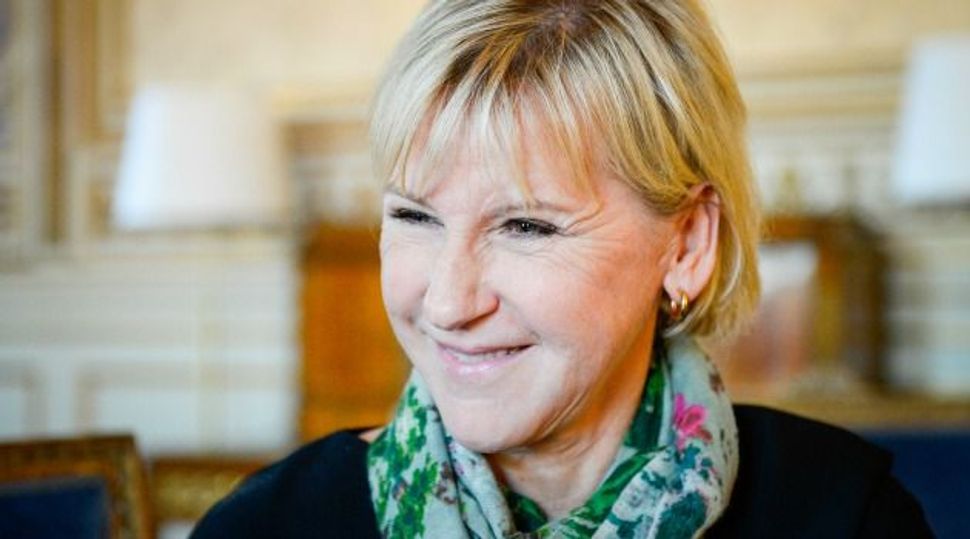Sweden Rift With Israel Deepens Over ‘Execution’ Remark

Image by Getty Images
Relations between Sweden and Israel hit a fresh low on Sunday after Israel said Sweden’s foreign minister had accused it of unlawful killings and Stockholm responded by saying that the comments had been “blown out of reasonable proportion.”
Relations between the two countries have nose-dived since Sweden’s Social Democrat-led government recognized a Palestinian state last year. Foreign Minister Margot Wallstrom deepened the rift by describing Palestinians’ plight as a factor leading to Islamist radicalisation.
In the latest row, Israel condemned as “scandalous” on Sunday what it said was a suggestion by Wallstrom its forces had unlawfully killed Palestinians involved in a surge of street violence, and warned of a diplomatic rupture with Stockholm.
Sweden said Wallstrom’s comments had been misunderstood.
“The Minister for Foreign Affairs did not, as alleged, say that extrajudicial executions occur in Israel,” Swedish Prime Minister Stefan Lofven and Wallstrom said in a statement.
“The situation in the Middle East is difficult enough without having to be encumbered by misunderstandings about anybody’s intentions.”
In the latest violence in Jerusalem, on Sunday, a Palestinian rammed his car into a passer-by in a Jewish neighborhood, slightly injuring him, and then got out of the vehicle and stabbed another man, who suffered superficial wounds.
Security forces shot the attacker dead, police said.
Addressing Swedish lawmakers on Friday, Wallstrom denounced the almost daily Palestinian knife, gun or car-ramming attacks but urged Israel to avoid excessive force.
“And likewise, the response must not be of the kind — and this is what I say in other situations where the response is such that it results in extrajudicial executions or is disproportionate in that the number of people killed on that side exceeds the original number of deaths many times over,” Wallstrom said in the official English translation of her statement provided by the ministry.
Sweden said she had been talking in general terms about the principles of international law concerning self-defense and the importance of responding in a proportional manner.
Wallstrom’s remarks, however, touched a nerve in Israel, whose forces have killed 103 Palestinians since Oct. 1, of whom it has identified 64 as assailants or who were caught on camera carrying out assaults. Most of the others died in clashes with police or troops.
The Palestinian attacks, fueled in part by strife over a contested Jerusalem shrine as well as a peacemaking process deadlocked since early 2014, have killed 19 Israelis and a U.S. citizen.
“I condemn the statements, the scandalous statements, made by the foreign minister of Sweden,” Israeli Prime Minister Benjamin Netanyahu told his cabinet in broadcast remarks.
“It seems she expects Israel’s citizens to bare their throats to those trying to stab them. This will not happen, and we will continue to protect the lives of Israel’s citizens.”
Deputy Foreign Minister Tzipi Hotovely said in a radio interview that she and Netanyahu, who also functions as foreign minister, would convene a meeting on Sunday to decide on what she anticipated would be a “sharp response” to Wallstrom’s comments.
Hotovely hinted at a possible exclusion of the Swedish government from Israeli efforts to revive peacemaking efforts with the Palestinians that have been stalled since early 2014.
“Sweden has crossed all red lines in relations with Israel,” Hotovely told Army Radio. “This is defamation of Israel and the statements are distancing Sweden from the ranks of enlightened nations that can take part in the dialog about rights in the region.”
A message from our Publisher & CEO Rachel Fishman Feddersen

I hope you appreciated this article. Before you go, I’d like to ask you to please support the Forward’s award-winning, nonprofit journalism so that we can be prepared for whatever news 2025 brings.
At a time when other newsrooms are closing or cutting back, the Forward has removed its paywall and invested additional resources to report on the ground from Israel and around the U.S. on the impact of the war, rising antisemitism and polarized discourse.
Readers like you make it all possible. Support our work by becoming a Forward Member and connect with our journalism and your community.
— Rachel Fishman Feddersen, Publisher and CEO























